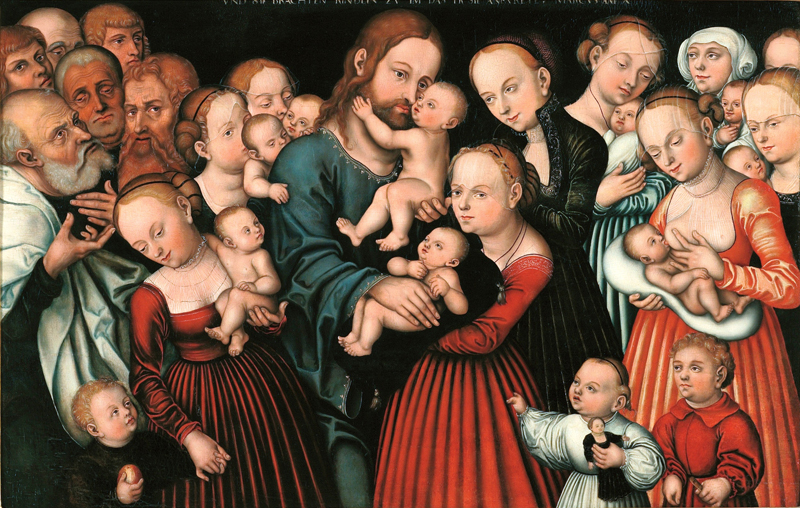
Christ Blessing the Children
Lucas Cranach, 1537
My dear friends,
In Mark 10:13-16, we read:
in order that he might touch them;
and the disciples spoke sternly to them.
But when Jesus saw this, he was indignant
and said to them,
"Let the little children come to me;
do not stop them;
for it is to such as these
that the kingdom of God belongs.
Truly I tell you,
whoever does not receive the kingdom of God
as a little child will never enter it."
And he took them up in his arms,
laid his hands on them,
and blessed them.
But the question is, how can one receive the kingdom of God as a little child, when spiritual growth often demands the release of innocence and ignorance? Here, we must not mistake the passage's meaning. When Jesus says to receive the kingdom of God as a little child, he is not advocating for a return to ignorance or immaturity. In fact, I believe he is pointing to qualities inherent in children that we can cultivate as mature adults.
First, there is the quality of openness. Children have an innate curiosity, an openness to new experiences. This is a necessary attribute in our spiritual path. We must be open to new perspectives, to challenging our own convictions, to understanding that our previous conceptions may be limited.
Second, there is the quality of trust. Children often exhibit an unguarded trust, an absence of cynicism. In a spiritual context, this could be understood as trust in the divine, or trust in the teachings of enlightened beings. This trust does not contradict critical thinking. Rather, it is a trust that emerges from our own experience and practice of the teachings.
Third, there is the quality of presence. Children are usually fully engaged in the present moment. In the spiritual journey, being fully present is crucial. It is in the present that we can learn and grow, truly experiencing and interacting with the truths of our existence.
What, then, are we to make of the Apostle Paul's words:
when I became an adult, I put an end to childish ways.
- 1 Corinthians 13:11
This too has profound significance. When Paul speaks of setting aside childish things, he does not mean forgetting the spiritual qualities we have discussed. Rather, he talks about outgrowing the immature tendencies – such as ego-centricity, impulsivity, and short-sightedness – that can also be associated with being a child. As we mature, we are called to combine the wisdom and responsibility of adulthood with the openness, trust, and presence of a child.
Receiving the kingdom of God as a little child, therefore, means embodying these childlike qualities without succumbing to childish behavior. It means being open to divine presence, trusting in the divine wisdom, and being fully present in each moment, all while taking responsibility for our actions and pursuing wisdom. This is a task not of regression, but of balanced, integrated growth.
Let us strive to embrace these lessons, not just as Christians or Buddhists, but as humans on our shared spiritual journey. Let us aspire to the innocence of the child, tempered with the wisdom of adulthood, and may this aspiration guide us toward true spiritual growth.